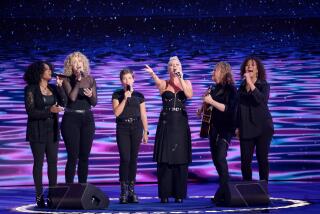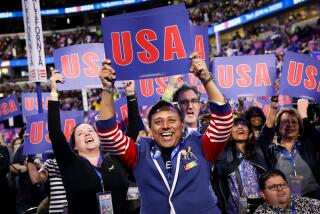A nod to blogs
- Share via
Meet “Anna.” You don’t need to know her last name. And Anna may not even be “her” real name.
What you need to know is that a Web user by the name of Anna liked a photograph Rick Heller put on the Internet so much that she posted a compliment for the world to see. “Rick, thank you for this picture!” she wrote. “This is the kind of stuff I hoped to see out of you convention bloggers. =)”
The photo depicts a lawn planted with lace-up boots, arranged pair by pair in long rows. It’s as though Boston opened its own Arlington National Cemetery, except the gravestones are made of tired brown leather. Heller put the photo on a Web page titled “Boots on the Ground” and typed this caption: “The American Friends Services Committee ... put out this display of 900 pairs of combat boots which symbolize American casualties in Iraq.”
Heller is one of dozens of bloggers who for the first time, as a group, were given press credentials to write about this week’s Democratic National Convention in Boston. But this story is not about whether bloggers are journalists, or whether journalists can blog. It’s about Anna and the 13 million other Americans who visit blogs, according to the Pew Internet & American Life Project, and why the audience for political blogs ballooned during the convention even as TV broadcast ratings tanked.
The answer lies buried online in public messages from readers to bloggers.
“CONGRATULATIONS!!!!” wrote Carolyn Armenta Davis, virtually screaming in a convention-eve message to Christopher M. Rabb, who writes the Afro-Netizen blog. “With Afro-Netizen an official blogger for [the] 2004 Democratic convention, Blacks and other enlighten[ed on]es have uncensured opportunities to read uncensured opinion from the Blacks both attending and involved in the convention and those of us at home preparing to vote in November.”
Davis was echoed by “Orange Mike,” a Wisconsin delegate to the Democratic convention: “I hope to see the bloggers out there (at BOTH conventions) paying attention to the topics that get ignored by the newshandlers and arrangement specialists, out of a pathetic and trembling fear that something unscripted might happen,” he posted on blogger Jessamyn West’s site, Librarian.net.
The blogosphere throbs with the concerns by bloggers and blog readers alike about how the professional media, while seen as distinct from political party apparatchiks, filter the news Americans read, see and hear. These are Web surfers who want to experience for themselves the civic equivalent of kernel code -- the most important part of the most important program a computer can run -- be it the Congressional Quarterly, Supreme Court rulings or unedited rhetoric from campaign headquarters.
According to a June 2004 survey by Blogads.com, “Why U.S. Bloggers Read Blogs,” bloggers attribute their interest in blogs overwhelmingly to “news I can’t find elsewhere” (79.7%) and “better perspective” (77.9%), followed by “faster news” (65.9%), “more honesty” (61.4%) and “transparent biases” (50.3%).
“Bloggers are about providing more points of view, about providing those points of view in an authentic and personal voice to people who often don’t trust what they read in print or hear on TV,” explained Amy Wohl, a longtime blog reader and writer, in an e-mail interview. “They’re all fascinating -- and very different than what I am hearing on TV (PBS) and reading in both print and online.”
The blogosphere is fabulously unscripted, and spans a spectrum of beliefs and interests as diverse as the Web itself. Consider the microcosm of Convention Bloggers (www.conventionbloggers.com), created by Dave Winer as a one-stop shop for blogs about the Democratic convention, where you can click from a chatty personal history of convention meals and the 1968 convention by delegate Alison Teal (Hot Flashes From the Campaign Trail) to a heartfelt appeal for Sudan (Jim Moore’s Blog) before surfing to straight political commentary on left-wing dailyKos and right-wing Instapundit.com, where 100,000-plus daily visitors make bloggers Markos Moulitsas Zuniga and Glenn Reynolds, respectively, the equivalent of 800-pound blogrillas.
To Wohl’s point, some of the posts look a lot like alternative news. The day after Davis congratulated Rabb on his press credentials, Afro-Netizen blogged that journalists and pundits weren’t appropriately acknowledging the importance of members of the Congressional Black Caucus who are campaigning for Sen. John F. Kerry in swing states Ohio and Florida.
“As Ohio is a bellwether for the nation, if Rep. Stephanie Tubbs Jones [D-Ohio] delivers in her congressional district and beyond, she would most certainly deserve ‘honorary white boy’ status and all the perks that come with it,” Rabb wrote.
Still other blogs function as op-ed pages, and the quality is top-tier. “Many people of faith support stem cell research,” typed United Church of Christ seminarian and blogger Chuck Currie after Tuesday night’s speech by Ron Reagan, who declared that a vote for Kerry is a vote for embryonic stem-cell research into disease cures. “In 2002, I attended a forum on stem cell research sponsored by Ecumenical Ministries of Oregon. The Rev. Dr. Audrey R. Chapman, director of the Dialogue on Science, Ethics and Religion for the American Association for the Advancement of Science in Washington, D.C., was the speaker,” Currie blogged.
Some blogs are both. Take CommentaryPage.com, for instance. Just after showing a little intellectual leg in a brief but learned deconstruction of comments by Rep. Joseph Hoeffel (D-Penn.) on Sudan, blogger Christopher Wavrin brought a reporter to her knees, giggling. How? With his description of an epidemic of boogie fever sweeping the convention floor.
“Take my advice, please: If you choose to watch the speeches on C-SPAN, you should turn away from the TV,” Wavrin wrote. “I’m glad the delegates are happy -- but this dancing must stop. Do Democrats across the nation want to be associated with some of these people? I’m trying not to be too mean, but when some of these people start gyrating, it’s haunting to watch. So, please: Look away.”
It’s a medium in motion. Which is perhaps why an essay posted late Wednesday by blogger Dan Bricklin (www.bricklin.com) was quickly recommended and linked by so many other bloggers. Bricklin brought to the subject the kind of insight one might expect from a co-inventor of VisiCalc, the first computer spreadsheet: “There’s no way bloggers could cover this all. But something is missing without them,” he wrote. “Bloggers are allowed (and encouraged) to give you the feelings, too, so they add an important element.”
Bricklin also laid down the next challenge for the blogosphere: to develop new tools to allow bloggers to respond to large-scale breaking news events. “We need to figure out how to get the right mix of manual and automatic when dealing with huge unfolding events,” he wrote. “Conventions are easy in a way, since we know about them in advance. Unexpected huge events (like 9/11 or an earthquake) are going to be even harder.”
What would Anna think?
We don’t know. We know only that she typed her message about the boot graveyard at 4:01 p.m. Tuesday, July 27, just a few hours before the Democratic National Convention escorted state Sen. Barack Obama (D-Ill.) into the media spotlight and launched a national epidemic of Obamamania.
And we know that when a newspaper reporter e-mailed her, requesting an interview, she didn’t respond.
More to Read
Get the L.A. Times Politics newsletter
Deeply reported insights into legislation, politics and policy from Sacramento, Washington and beyond. In your inbox three times per week.
You may occasionally receive promotional content from the Los Angeles Times.










